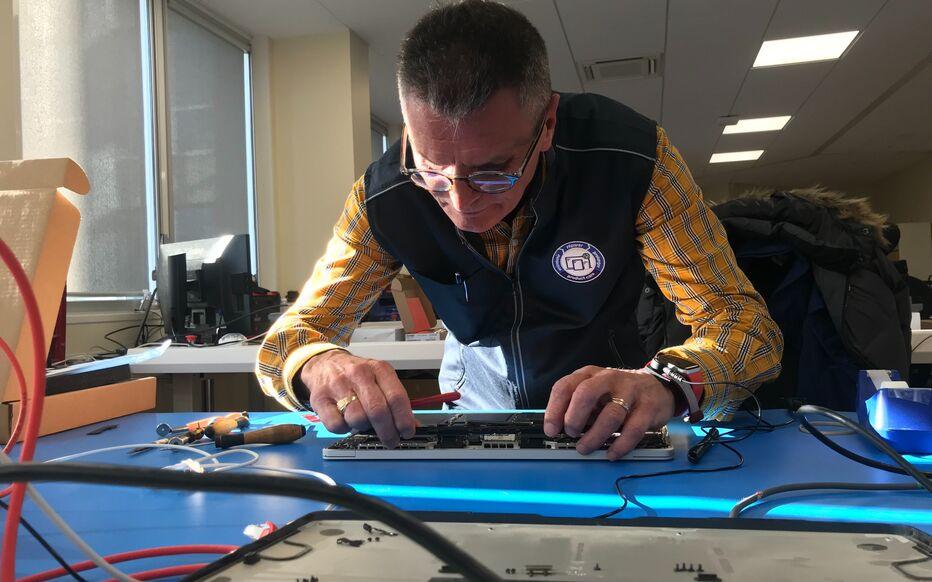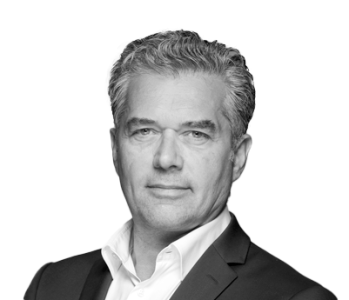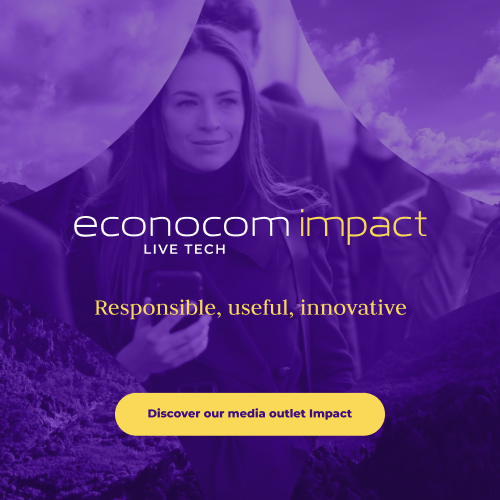Summary
Circularity is the solution
Click on this infographic to view the fields of action
Easi, the universal impact
At the heart of our services for the responsible economy, Easi is a comprehensive offer providing a coherent response to the various needs of companies.
Easi is Econocom as-a-service solutions for Impact.
Our focus is on as-a-service, which enables companies of all sizes to control their cash outflows very precisely. Easi is therefore a pay-as-you-go solution finely adapted to the needs of each client company, with personalised support from Econocom teams, by a single person in charge and for a single fee.
Interview Gaëlle Masson
The Econocom Impact podcast: Gaëlle Masson - Marketing and Development Director
Easi : Econocom As a Service for Impact
Easi is helping to rapidly reduce environmental impact, but the solution is also helping to transform usage and behaviour by integrating the solidarity economy into the hardware's life cycle, allowing buy-back for private use and providing access to carbon offsets. The solution is generating economic, environmental and societal impact.
Within EASI, a number of independent offers can be selected according to the specific needs of our customers - such as Product Care.
Product Care, proof of sustainability

Crédit : Jeanne Cassard - Le Parisien.
Product Care is responsible for user incidents, relieving the IT Department of administrative and technical tasks, with service continuity and terminal fleet supervision.
The service contributes to the virtuous circle of the circular economy by extending the lifespan of hardware, maximising its value and reducing the environmental footprint of digital technology. The Product Care service centre is the premium multi-brand after-sales service for mobility, with 1 million mobile devices under management.
almost 1 million mobiles under management
Product Care has been awarded the QualiRépar label. Based on rigorous criteria, this distinction attests to the quality and reliability of the operations carried out in the service centre as well as the expertise of the teams.
Green & Energy, the dual transition
The digital transition is enabling the energy transition
Green & Energy is a Group business unit whose mission is to provide consulting, financing and implementation solutions for the energy transition. The BU's experts work with our customers on their strategy in order to reduce the environmental footprint of their activities while optimising their costs.
An energy audit of the installations is a prerequisite for consultancy, since it identifies potential areas for savings. However, our services cover the entire process:
Energy diagnosis process
Project management assistance,
Project management,
Automated management of energy bills,
Supervision of consumption,
Financing facilities and works,
Validation of Energy Savings Certificates,
Centralisation and analysis of energy and asset data
Like all Econocom services, we aim to keep the financial impact as low as possible. This is why we offer a single fee, largely self-financed by the energy savings generated.
Green & Energy has contributed €70m to the financing of virtuous projects for the energy transition of companies.
In 6 years, the saving is: 58,000 CO² EQT
Share info
Green & Energy publishes a newsletter several times a year. It’s a summary of the regulatory and geopolitical context of renewable energies, intended for our partners and customers as well as our teams, with examples of concrete solutions proposed by the Business Unit.
Interview Frédéric Louguet
Frédéric Louguet

A global response to multiple imperatives
"Our customers expect specific technical and financial expertise. We offer turnkey solutions for the energy transition which preserve cash-out. This enables innovative, high-quality projects to be completed on time and ahead of the regulations. Financing is a powerful lever for accelerating technological and energy transitions.“
Frédéric, why is there a specific business unit called Green & Energy? What do clients expect? What progress, obstacles and results can we see today?
Solutions in energy efficiency require specific technical and financial expertise, so the business unit has developed technical areas of expertise for Econocom that are innovative. These include BMS (1) methods, solar photovoltaics (2), LED lighting (3), heat recovery (4), HVAC (5), electric-vehicle charging stations and a platform for tracking energy consumption. At the same time, we’ve developed specially adapted models of financing (specific durations depending on the assets, calculations of the economic and environmental effects of projects, access to green funds, subsidies, ESCs (6), etc.).
Clients expect turnkey technical and financial solutions that help speed up their energy transition, while keeping their cash flow positive with high-quality projects, all with respect for deadlines and regulations.
Technological disruptions and regulations are conducive to business development (these regulations include France’s service-sector decree (7), its ‘BACS’ decree (8), its ‘LOM’ law (9) and its law for speeding up renewables). We’ve been profitable ever since the business unit was created in 2017, but the two years of Covid considerably slowed down projects with our clients and prospects in a phase of launching a new activity. These projects require a sales and execution process that’s much longer than in conventional digital technology. The energy crisis gave a fresh boost to the market at the start of 2022 with ever greater imperatives for energy restraint. We had to quickly adapt to the markets of BMS methods and solar photovoltaics, which drive our main projects today. The main obstacles are access to decision-makers, legislation that’s not always explicit about the responsibilities of owners and tenants, and public administrative workings that are slow and cumbersome.
How do clients view your offer of services? How do they see the innovation and added value that they bring? What’s the priority in their decision-making process?
Our clients are highly satisfied with our turnkey services and the economic results combined with an environmental impact that our solutions bring. Innovation drives the energy transition. And mastery of new impact technologies, regulation and diversified models of financing (ESCs, green funds, leasing with adapted durations, a search for subsidies, etc.) are all unique major assets for our clients and prospects.
The priorities of our B2B clients are a search for savings in a context of sharply rising energy costs, energy restraint, projects with an environmental impact, and respect for regulations.
Expectations are high. What sales trend should we be focussing on in the coming years? What is the business unit aiming for in the next three years?
Expectations are indeed very high for firms when you consider everything from the CSRD, stakeholder relations and CSR policies to cost reductions, control over energy consumption and respect for regulations.
For us, the trends are clearly steering towards solar photovoltaics for private consumption, BMS (Building Management System) methods and the installation of electric-vehicle charging stations to encourage green mobility, most often in the form of turnkey solutions that include ESCs, subsidises and, if need be, a remaining amount financed by the savings made.
The business unit’s aims for the next three years are to actively take part in the development of leasing offers with an increasingly technical and financial dimension that matches the group’s DNA better.
But we especially aim to go from a new offer to an offer strongly rooted in the group. In terms of sales, we aim to reach €30m in recurring revenue and to take part in the new strategic plan.
To support our growth in ESCs, we plan to develop partnerships with solar EPC contracts and energy services, like we did in 2018 with our acquisition of 20% of the capital of Clever Energies, in order to get more quickly involved in the market of LED lighting in firms.
We’re aiming to have the best possible social and environmental impact. Are we going about this well? How can we do this better?
The Green & Energy business unit’s offer is completely in line with this aim of a better environmental impact for Econocom. We offer our expertise in this field, putting it to good use in our clients’ energy transition. Like in all technological disruption, financing is a great driver for speeding up transitions in technology, digital services and energy today.
Intrapreneurship is a strong value in the group and this has helped bring about the Green & Energy offer in France. In the space of seven years, we’ve gained a lot of experience and enjoyed success in sales. All this has strengthened us for growth in France. We’ve opened an equivalent business unit for Benelux. And we might launch this offer in all our other countries. The decarbonisation market is global and we can contribute to it much more.
Glossary of technical terms
- BMS (1): Building Management System. This term usually denotes the different technical and engineering aspects involved in managing and using a building. It covers a wide range of activities carried out to maintain, monitor and optimise a building’s technical systems, such as its heating, ventilation, and air conditioning (HVAC), its electrical systems, and its plumbing. In the context of managing installations and real estate, a Building Management System can include upkeep and repairs for ensuring that all a building’s technical systems are well maintained and repaired quickly in the event of problems.
- Solar photovoltaics (2): Photovoltaic solar energy is a source of renewable energy that uses sunlight to generate electricity. It is based on use of photovoltaic cells: electronic devices that can convert sunlight into electricity.
- LED lighting (3): The acronym ‘LED’ stands for ‘Light-Emitting Diode’. It is a form of lighting technology based on use of electroluminescent diodes to produce light. This lighting technology has gained popularity in recent years as it offers many advantages over more traditional forms of lighting, such as incandescent light bulbs and fluorescent lamps. Here are a few of its key advantages:
1. **Energy efficiency **: LEDs are highly energy-efficient. They convert a high amount of electrical energy into light alone, which reduces energy consumption compared to other forms of lighting.
2. **Lifespan **: LEDs have far longer lifespans than traditional bulbs. They can last for tens of thousands of hours, which means that bulbs are replaced less often and there is less waste.
3. **Durability **: LEDs are robust and shockproof and they resist vibration and changes in temperature, making them ideal for a range of environments.
- Heat recovery (4): Heat recovery, also known as residual waste heat recovery, is a process that aims to recover and reuse heat that would otherwise be lost during different industrial activities, production operations or heating processes. This practice improves energy efficiency: it reduces useless heat loss by repurposing this waste heat.
- HVAC (5) is an acronym for heating, ventilation, and air conditioning. This term denotes a group of systems and machines used in buildings such as houses and apartment blocks and that regulate the building’s indoor temperature and air quality to ensure a certain level of comfort.
- ESC (6): Energy Savings Certificates. The Energy Savings Certificates (ESC) scheme was set up to finance the energy transition. The scheme compels energy suppliers (in gas, fuel oil and electricity) to incite firms to make energy savings during given periods through energy transition renovation that includes, for example, BMS methods, LEDs and heat recovery.
- France’s service-sector decree (7): As part of France’s ‘ELAN’ law to reform housing in France, after the country’s ‘Grenelle II’ law for the environment, France’s service-sector decree obliges lessors and occupants of buildings with a floor area of over 1,000m² used for service-sector activities to reduce their energy consumption by at least 40% by 2030, 50% by 2040 and 60% by 2050.
- France’s ‘BACS’ decree (8): France’s ‘BACS’ (‘Building Automation and Control Systems’) decree (20 July 2020) determines the methods that can be used to reach the aims to reduce consumption set by France’s service-sector decree. Existing service-sector buildings are concerned by the BACS decree where the power of systems providing heating or air conditioning (or a combination of both systems with ventilation) is greater than 290kW.
- France’s ‘LOM’ law (9): France’s ‘LOM’ law for transport and mobility is a French law that was passed in 2019. Its purpose is to transform mobility in France through significant reforms in different fields of transport and sustainable mobility. Among its key points, the ‘LOM’ law aims to encourage more sustainable modes of transport, such as public transport, carsharing, cycling, walking and electric-vehicle charging stations.
- CSRD (10): Corporate Sustainability Reporting Directive The CSRD is a new directive that the European Commission introduced to require non-financial reporting from firms in regard to sustainable development and to supervise such reports better.
- Solar EPC contracts (11): An Engineering, Procurement and Construction (EPC) contract is a type of contract that is widely used in large-scale building and engineering projects. An EPC contract is a method for carrying out a project that incorporates design, engineering, supplies of materials, and construction.



